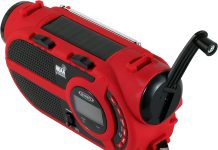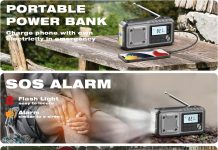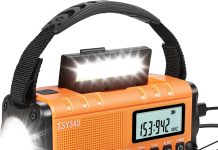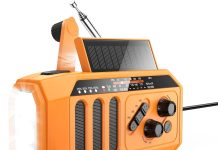In this article, we explore the potential risks of using expired batteries in an emergency radio. Have you ever wondered if those forgotten batteries at the back of your drawer could harm your trusty radio? We delve into this topic to shed light on whether expired batteries pose a threat to the functionality and longevity of your emergency radio. Join us as we uncover the surprising truth behind the expiration date on batteries and how it could impact their performance when powering your essential communication device. Prepare to be enlightened and reassured or, perhaps, urged to take action.
Review contents
Overview
Introduction to expired batteries and emergency radios
In the realm of emergency preparedness, having a fully operational radio is essential. It serves as a lifeline during times of crisis, providing valuable information, updates, and instructions. However, the effectiveness of an emergency radio can be compromised when powered by expired batteries. In this article, we will delve into the potential damage caused by expired batteries on emergency radios and highlight the importance of proper battery maintenance.
Understanding the potential damage caused by expired batteries
When batteries expire, they can pose various risks to electronic devices, including emergency radios. The chemical reactions within batteries degrade over time, affecting their ability to generate power efficiently. This deterioration can lead to reduced performance, power drain, interference issues, and even damage to the internal components of the radio. It is crucial to be aware of these potential dangers and take proactive steps to prevent any adverse effects on the functionality of our emergency radios.
How Batteries Expire
Factors contributing to battery expiration
Several factors contribute to the expiration of batteries. One primary factor is the passage of time. As batteries sit unused, their internal chemical reactions continue to occur, gradually degrading their performance. Additionally, exposure to heat, moisture, and extreme temperatures can accelerate the aging process of batteries. High humidity levels, for instance, can lead to chemical reactions that reduce battery capacity. It is important to be mindful of these factors as they can significantly impact the longevity of our batteries.
Signs of battery expiration
Detecting battery expiration is crucial in preventing any potential damage to our emergency radios. Some common signs of battery expiration include a swollen appearance, leakage, or corrosion on the battery terminals. Moreover, expired batteries may also exhibit reduced voltage levels, resulting in diminished power output. It is advisable to regularly inspect the condition of our batteries to identify any signs of expiration promptly.
Effects of Expired Batteries on Emergency Radios
Understanding the connection between expired batteries and radio damage
Expired batteries can adversely affect the overall functionality of emergency radios. As the chemical reactions within the batteries degrade, they produce less energy, resulting in reduced power supply to the radio. This diminished power supply can cause various issues, including weak or distorted radio signals, poor reception, and even complete loss of signal. It is crucial to recognize the link between expired batteries and potential radio damage to ensure the radio’s optimal performance during critical situations.
Possible risks and faults in emergency radios
When using expired batteries in an emergency radio, there is a heightened risk of encountering technical faults and malfunctions. The decreased power output from expired batteries can strain the electronic components of the radio, leading to increased wear and tear. Moreover, the weakened power supply can negatively impact the radio’s internal circuits and cause intermittent or permanent damage, rendering the radio unreliable or inoperable when it is needed most. Thus, it is vital to avoid using expired batteries in emergency radios to mitigate these risks.
Impact on Radio Reception
Interference issues with expired batteries
One of the significant consequences of using expired batteries in emergency radios is the interference it can cause during radio transmissions. The diminished power supply from expired batteries may result in erratic or weak radio signals, leading to reduced clarity and disruptions in communication. These interference issues can severely hamper the ability to receive critical information during emergencies, compromising the effectiveness of the radio as a lifeline.
Reduced sensitivity and signal loss
Expired batteries can also impact the sensitivity of the emergency radio’s receiver. The weakened power supply can reduce the sensitivity of the radio’s antenna, making it less able to capture and amplify weak signals. Consequently, the radio may struggle to pick up transmissions from distant stations, leading to signal loss or reception difficulties. To ensure uninterrupted radio reception during critical times, it is essential to power the radio with fresh and reliable batteries.
Power Drain and Performance
Higher power consumption
Expired batteries tend to drain power at a faster rate compared to fresh batteries. As the chemical reactions within expired batteries become less efficient, they require a higher voltage to produce an adequate power output. This increased power demand can result in accelerated power drain and shorter battery life. In emergency situations, where access to fresh batteries may be limited, using expired batteries could leave us without a functional radio when we need it most. Therefore, it is crucial to prioritize the use of fresh batteries to optimize the performance and longevity of our emergency radios.
Diminished output and functionality
The diminished performance of expired batteries directly impacts the output and functionality of emergency radios. The reduced power supply results in a weaker audio output, making it harder to hear broadcasts clearly. Moreover, expired batteries may cause intermittent disruptions or sudden shutdowns, depriving us of vital information when we rely on the radio for updates and instructions. To maintain optimal performance and ensure uninterrupted functionality, it is necessary to replace expired batteries promptly.
Risk of Battery Leakage
Corrosion and leakage of expired batteries
Expired batteries are more prone to leakage and corrosion compared to fresh batteries. The chemical reactions within expired batteries can produce gases and substances that corrode the battery terminals and surrounding components. This corrosion can interfere with the proper functioning of the emergency radio, causing disruptions in power supply or even permanent damage. The leakage of corrosive chemicals from expired batteries can also pose a safety hazard, potentially harming the user and contaminating the radio. It is crucial to handle expired batteries with care and to dispose of them properly to minimize the risk of leakage and corrosion.
Potential damage to internal components
The leakage of corrosive chemicals from expired batteries can seep into the internal components of the emergency radio, causing irreversible damage. Acidic leaks can erode circuit boards, corrode metal contacts, and compromise the overall integrity of the radio’s internal structure. This damage can lead to malfunctions, rendering the radio useless during emergencies. By avoiding the use of expired batteries, we can safeguard the internal components of our emergency radios and ensure their reliability when we need them the most.
Long-Term Consequences
Cumulative effects of using expired batteries
The impact of using expired batteries in emergency radios extends beyond immediate performance issues. Over time, the cumulative effects can lead to accelerated wear and tear, reducing the overall lifespan of the radio. The strain on internal components caused by diminished power supply can gradually deteriorate the radio’s functionality, resulting in a shorter operational lifespan. By recognizing the long-term consequences, we are encouraged to prioritize the use of fresh batteries and implement proper battery maintenance practices.
Accelerated wear and tear on the radio
The continuous use of expired batteries can accelerate the wear and tear on various parts of the emergency radio. As the battery’s reduced power output strains the internal circuits, components, and mechanisms, it can lead to premature aging and deterioration. Buttons may become less responsive, knobs may become loose, and overall performance may decline. To prolong the lifespan of our emergency radios, we must make an effort to use fresh batteries and provide regular maintenance.
Preservation and Maintenance
Proper storage guidelines for batteries
To ensure the longevity and effectiveness of our batteries, it is essential to follow proper storage guidelines. Storing batteries in a cool, dry place away from direct sunlight and extreme temperatures can significantly slow down the aging process. It is advisable to store batteries in their original packaging or separate compartments to prevent contact between terminals, reducing the risk of unintentional discharge. By adhering to these storage guidelines, we can preserve the quality of our batteries and maintain their optimal performance.
Regular maintenance practices for emergency radios
Maintaining our emergency radios is crucial to maximize their lifespan and reliability. Regularly inspecting the battery compartment for any signs of corrosion or damage is essential. Additionally, cleaning the battery terminals with a cotton swab dipped in vinegar can help remove any accumulated corrosion, ensuring proper electrical contact for fresh batteries. It is also recommended to clean the radio’s exterior regularly, removing any dust or debris that could interfere with its functionality. By implementing these regular maintenance practices, we can ensure that our emergency radios are always ready for action.
Battery Testing and Replacement
Methods for testing battery performance
Regularly testing the performance of our batteries is crucial to assess their reliability. Various methods can be employed to test battery performance. One simple method is using a multimeter to measure the voltage output of the batteries. Comparing the measured voltage with the required voltage for the radio can indicate whether the batteries are still capable of providing sufficient power. Another method is to use the batteries in a low-power device and monitor their performance. By periodically testing our batteries, we can identify any decline in performance and replace them before they compromise our emergency radios.
When and how to replace expired batteries
Knowing when to replace expired batteries is vital in maintaining the functionality of our emergency radios. It is advisable to replace batteries before they reach their expiration date to avoid any potential risks. Additionally, if batteries exhibit any signs of expiration, such as swelling, leakage, or corrosion, immediate replacement is necessary. When replacing batteries, it is essential to check the radio’s user manual for the recommended battery type and follow the instructions for proper insertion and orientation. By promptly replacing expired batteries according to these guidelines, we can ensure our emergency radios are powered by reliable energy sources.
Conclusion
Summarizing the impact of expired batteries on emergency radios
In conclusion, expired batteries can have detrimental effects on the performance and reliability of emergency radios. These effects include interference issues, reduced sensitivity, power drain, and potential damage to internal components. Furthermore, the cumulative impact of using expired batteries can accelerate wear and tear, shortening the operational lifespan of the radio. To avoid these consequences, it is crucial to prioritize battery maintenance, including proper storage, regular inspection, and timely replacement of expired batteries.
Encouragement for proactive battery maintenance
By taking proactive steps to ensure the freshness and reliability of our batteries, we can enhance the effectiveness of our emergency radios and optimize their performance during critical situations. Regularly checking for signs of expiration, conducting battery tests, and following proper maintenance practices can go a long way in preserving the functionality of our emergency radios. Let us all commit to proactive battery maintenance, ensuring that our lifeline remains strong and dependable when we need it most.



































